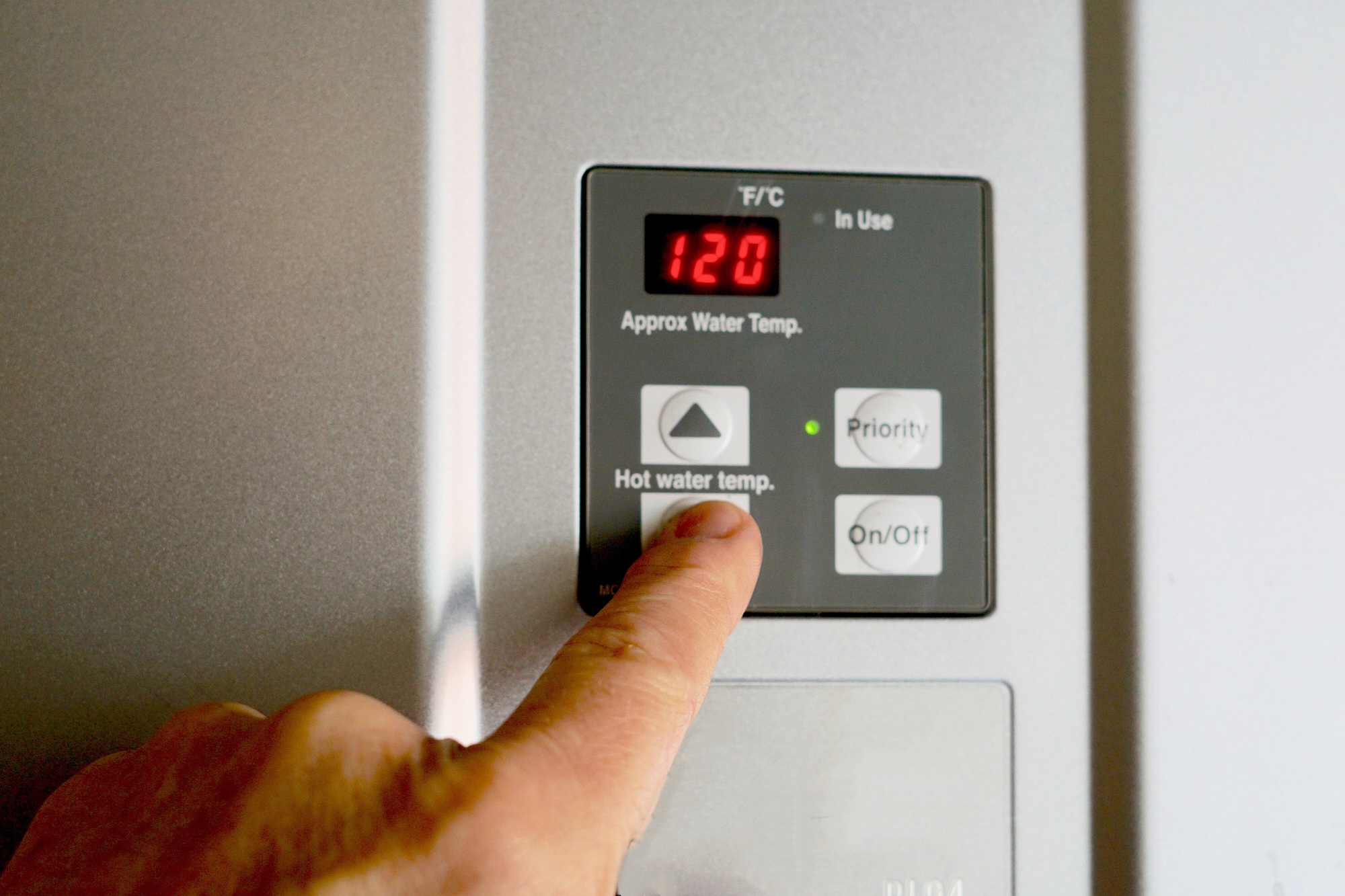No one likes a surprise cold shower—or worse, a flooded home.
Your water heater works quietly in the background, but it won’t last forever. Knowing when to replace water heater units can save you from costly repairs, water damage, and stress.
It’s also a great chance to boost your home’s energy efficiency. Older water heaters use more power and drive up your energy bills. Upgrading to a high-efficiency model—like a heat pump water heater—can cut those costs significantly.
This guide breaks down seven clear signs your water heater may be on its way out. If you spot any of them, it might be time to stop repairing and start replacing.
Replacing Your Water Heater: Signs to Look for
1. Water Heater Is Pass Its Lifespan
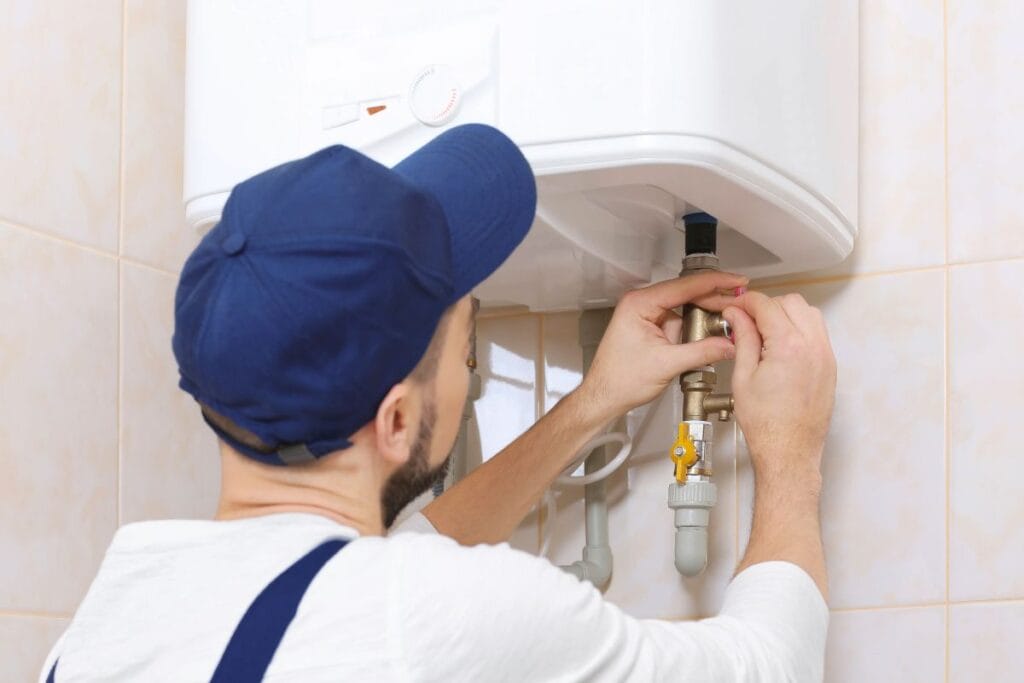
Knowing your water heater’s age helps you avoid surprise breakdowns. Most water heaters don’t last forever. The type of unit impacts its lifespan.
Typical Heater Lifespan by Type:
- Tank water heater (gas or electric): 8–12 years
- Tankless water heater: Up to 20 years with proper care
- Heat pump water heater: Around 15–20 years with maintenance
If your unit is 10 years or older, start planning for a replacement.
How to Find Your Water Heater’s Age:
- Check the serial number on the label (usually near the top of the unit). It includes the manufacture date.
- If the serial number is confusing, search the brand’s website or contact a pro for help.
- Not sure at all? Call for a water heater inspection—quick and easy.
When to Replace Your Water Heater: Why It Matters
- An old or malfunctioning water heater can leave you with no hot water.
- Older models lose efficiency and may lead to higher energy bills.
- If it’s out of warranty, repair costs come out of pocket.
Helpful Tips:
- Don’t wait until there’s a water leak or total breakdown.
- If you’re unsure whether to repair or replace, compare heater repair costs vs. a new unit.
- Consider upgrading to a pump or gas water model for better performance and energy savings.
2. Discolored or Rusty Water? It’s a Red Flag
Notice brown or rusty water when you turn on the tap? That’s not normal—and it could mean trouble with your water heater.
What It Might Mean:
Rust in your hot water often points to internal corrosion in your gas water heater or electric tank. It’s usually a sign that your tank is wearing out from the inside.
Rusty water = warning sign your water heater may be failing.
Why This Happens:
Every tank heater has something called a sacrificial anode rod. Its job is to attract rust and protect the tank lining. Over time, this rod wears away. Once it’s gone, rust attacks the tank itself.
Once rust takes hold inside the tank, there’s no easy fix.
What You Can Do:
- Try flushing the tank—sometimes it clears out minor sediment and rust.
- Still seeing discolored water? It’s probably time to replace your heating unit.
- Water heater repair won’t help if the tank is corroded—it’s better to invest in a new unit.
Helpful Tip:
- Don’t ignore it. Rusty water can damage clothes, fixtures, and your plumbing.
- Want to avoid this in the future? Ask a pro about replacing the anode rod every few years—it extends your unit’s lifespan.
If flushing doesn’t fix the problem, replacing your hot water heater is the safest move.
3. Hot Water Running Out Too Fast
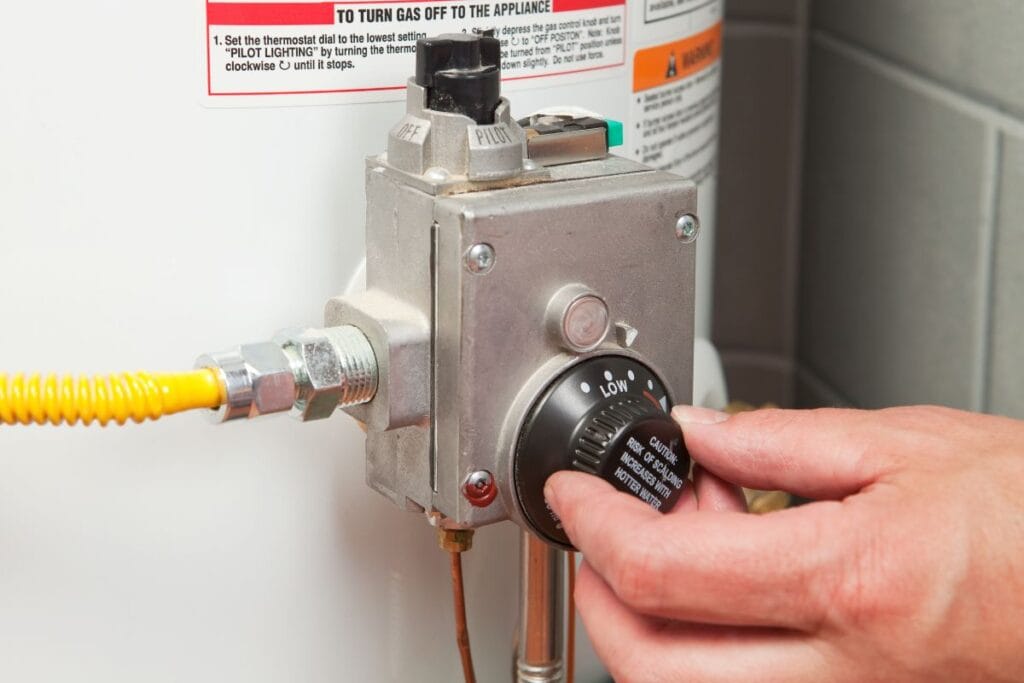
Running out of hot water halfway through a shower? That’s one of the most common signs something’s wrong with your hot water heater.
In many cases, the problem is sediment buildup at the bottom of the tank. Over time, minerals from your water settle and harden inside your water heater, taking up space and making it harder to heat the water properly. That means less usable hot water for your home.
Another reason could be aging components, like a worn-out heating element or thermostat that no longer works efficiently. And if your home has grown—more people, more bathrooms, more laundry—you might simply have an undersized water heater that can’t keep up with demand.
If your hot water doesn’t last like it used to, your water heater might be struggling to do its job.
Here’s what to check:
- How old is the unit? If it’s over 8–10 years, it may be time to upgrade.
- Have your needs changed? A larger household may need a higher-capacity tank or a tankless type heater.
- Is maintenance overdue? Flushing your tank once a year can help remove sediment and extend its life.
If the issue keeps coming back, water heater replacement might be more cost-effective than constant heater repair.
4. Loud Noises from the Tank
Hearing strange sounds from your water heater? If it pops, rumbles, or bangs while running, don’t ignore it.
These noises usually mean there’s hardened sediment built up at the bottom of the tank. Over time, minerals from your water settle and form a thick layer. When the unit heats water, it has to work harder to push past that barrier—causing those loud sounds.
The louder it gets, the more strain you’re putting on the unit.
You can try flushing the tank to clear the buildup. It might help, especially if the noise has just started. But if the sounds keep coming back, the problem may be more serious—and permanent.
In that case, it’s smarter to stop spending on repairs and start thinking about a replacement. A tankless heater or pump-style heater is a quieter, energy-efficient option that also avoids sediment issues altogether.
Loud noises are your heater’s way of saying it’s time for a change. Don’t wait until it fails.
5. Leaks Around the Unit
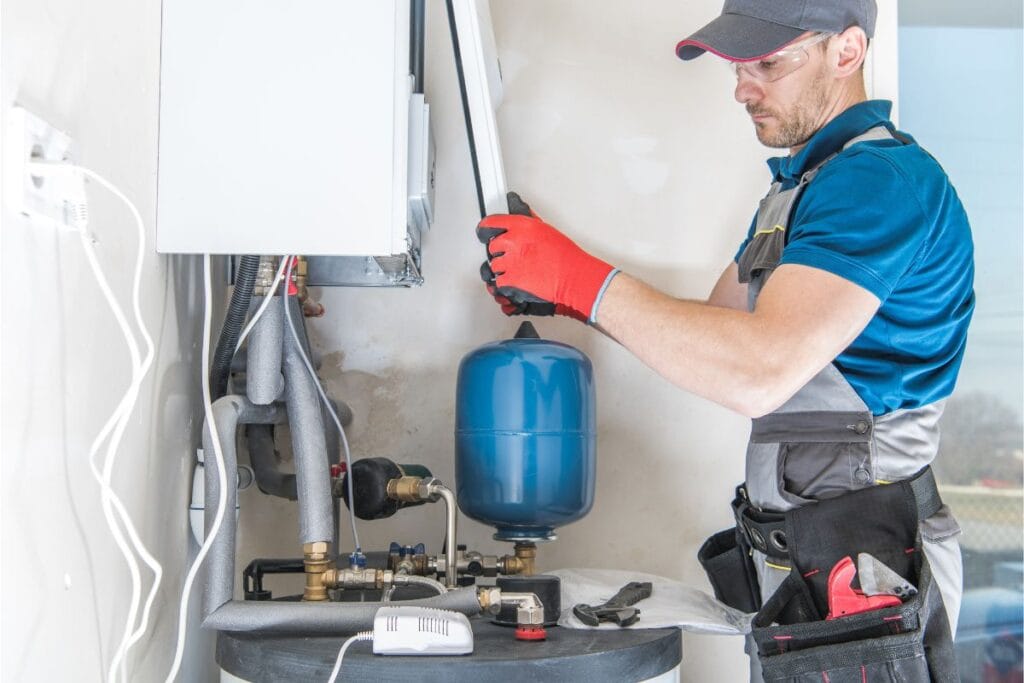
See water pooling near your heating unit? That’s a serious warning sign you shouldn’t ignore.
Leaks or moisture around the base of the unit often mean something inside has cracked or corroded. It could be a failing tank, loose fittings, or worn-out connections. Either way, it’s not something to take lightly.
A leaking unit can quickly lead to water damage, mold, and costly repairs.
Here’s what to look for:
- Damp spots on the floor around the unit
- Drips or puddles underneath the tank
- Corrosion near valves, fittings, or seams
In rare cases, a simple fix—like tightening a connection—might solve the issue. But if the tank itself is leaking, no heater repair will save it. A broken water heater like this needs to be replaced as soon as possible.
Don’t Forget to Check Your Water Heater Warranty
This is also a good time to check the warranty. If it’s expired, continuing to repair the unit could cost more than installing a new, efficient pump or gas heating unit.
6. Your Energy Bills Are Spiking
Noticing higher utility bills with no change in your usage? Your water heater might be the problem.
As your heating unit gets older, it becomes less efficient. It has to work harder—and run longer—to heat the same amount of water. That extra effort shows up in your energy costs month after month.
An aging or poorly performing heating unit wastes energy and money.
Here’s why it happens:
- Sediment buildup insulates the tank, making it harder to heat water.
- Worn-out heating elements in an electric water heater struggle to keep up.
- Older gas water heaters lose efficiency over time, even with regular maintenance.
If your water heater lifespan is already near the 10-year mark, or you’re constantly adjusting the thermostat to get enough hot water, that’s a red flag. Upgrading to a newer, energy-efficient unit—like a heat pump unit or a high-efficiency gas hot water system—can lower your monthly bills significantly.
Check to see if your heater warranty is still active. If it’s not, it may be more cost-effective to replace your unit rather than pay for ongoing repairs and high energy bills.
7. You’re Constantly Calling for Water Heater Repair
If your water heater seems to break down every few months, it’s time to step back and look at the bigger picture.
Frequent heater repair calls aren’t just frustrating—they’re expensive. Parts and labor add up quickly, especially if your unit is out of warranty. And let’s be honest: No one wants to keep dealing with cold water or surprise service visits.
Here’s when you know it’s time:
- You’ve had multiple repairs in the past year
- The same issues keep coming back (leaks, noise, temperature problems)
- The unit is nearing the end of its lifespan (8–12 years for a tank model)
At that point, putting more money into a failed water heater just doesn’t make sense. Instead, consider upgrading to a modern, efficient tankless or pump water heater. These models last longer, use less energy, and require far less maintenance.
Avoid Surprises—Know When It’s Time for a New Water Heater
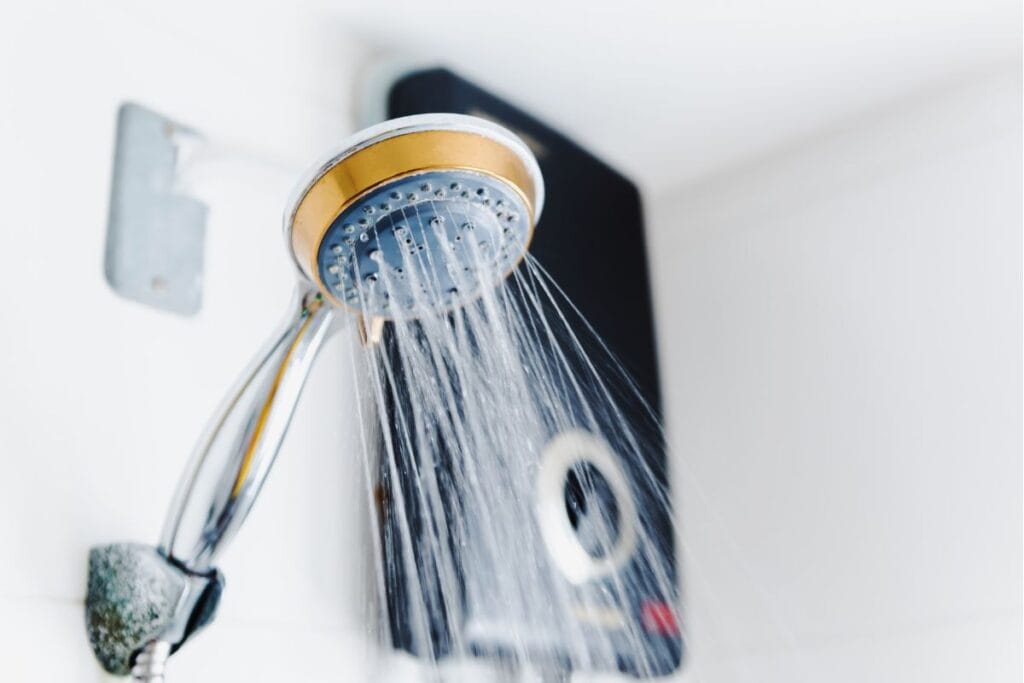
Your water heater gives you plenty of warning signs before it fails—you just have to know what to look for.
Let’s recap. If you’re dealing with any of these issues:
- An aging unit
- Rusty or discolored water
- Running out of hot water too fast
- Strange noises from the tank
- Leaks or moisture around the unit
- Rising energy bills
- Frequent repair calls
…it might be time to replace your heating unit.
Don’t wait for a full breakdown. A quick inspection today can save you major stress (and money) tomorrow.
At JW Plumbing Pros, we make it easy to stay ahead of the problem. Whether you need fast water heater repair or a full water heater replacement, we’ve got you covered. Our licensed team can help you choose the right solution—whether it’s a gas water heater, an electric model, or a high-efficiency heat pump water heater that saves on energy.
Contact us today for expert service, honest pricing, and hot water you can rely on.







